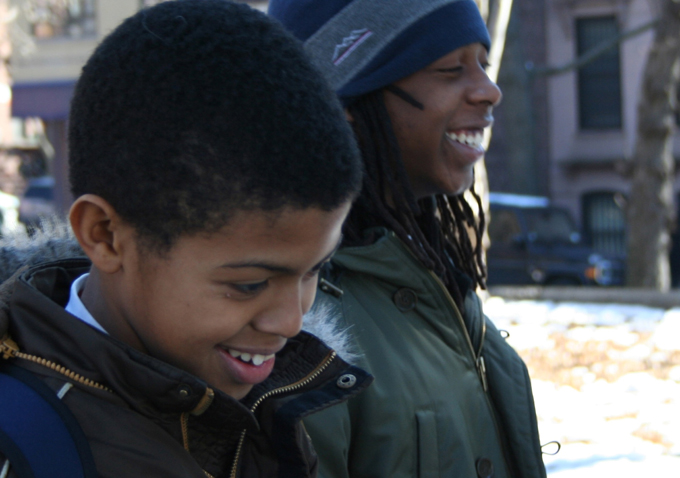
Raising a child seems to be both an act of love and faith. You provide the absolute best you can for them, and then hope and trust that you’ve put them on a path that will lead to the kind of rich and fulfilling life you want them to have. But even in a situation where seemingly nothing is left to chance, and only the finest opportunities are afforded, so much is decided by chance and fate. And the expectations that parents place in their children, and the dreams that children envision for themselves, can often diverge. Watching your child grow is a continual act of acceptance and renewal of love of who that child has become. And all of this is observed in Joe Brewster and Michèle Stephenson‘s “American Promise,” in which the filmmakers take a page from “Hoop Dreams,” turning the camera on their own son Idris and his best friend Seun, and tracking their education and lives from grade school through graduation.
The Dalton School on the Upper East Side of Manhattan is viewed by both sets of parents as the ideal starting point for their children. While it may not offer the racial diversity of their own community, or the kind of mix you might find in a good public school, Dalton has the pedigree, educators and program that can take both Idris and Seun far. It’s the kind of school, as we witness in the film, where kids can put down their thoughts and feelings about 9/11 and it gets read by someone at the U.N. This is a school with connections to the kind of world that Idris and Seun’s parents could never have dreamed of. And for Dalton, well aware that their student body could stand to use more color, welcome these additions, though point out that these kids aren’t in the school because they are tokens; it’s still academics and potential that allow Idris and Seun in their hallowed halls. But the best intentions have very different results for these two young children.
The sensitive Idris, who can be easily reduced to tears, mostly shines at Dalton, a bright kid who can be inattentive and unfocused at times. But he finds his place in the structure there, though his proper English leaves him somewhat alienated from the children on his own block back home. As for Seun, he less easily integrates into the system and struggles academically, even if socially, his ability to hang with any clique never leaves him wanting for company. And then the film takes an interesting turn when its subjects diverge for high school, with Idris staying on at Dalton, and Seun moving to the mostly black public school, Benjamin Banneker Academy. “American Promise” rightfully never attempts to make any sweeping statements about which is a better environment for a child, because the filmmakers—likely learning as they shoot the documentary, and raise their children—have learned throughout the various twists and turns that all the preparation in the world can never make you fully ready for what’s to come.
But this is where questions arise when it comes to “American Promise.” The crucial distinction between this documentary and similarly formed efforts, is that the filmmakers are invested in the subjects deeply, and are subjects of the movie themselves. To be fair, Joe and Michèle never let themselves off the hook, and both have more than once scene that would embarrass any parent who has acted similarly, or had misgivings about their own offspring. (Michèle’s tearful confession that she wishes Idris had the same self-starter motivation she did at his age is particularly bracing, while Joe tends to take the path that less sympathy will build a stronger person.) But because there is no completely objective third party, one wonders how much complete truth is actually up on screen. Are we seeing an unabridged reality, or reality the Stephensons want us to see of their lives? Certainly, with editorial control over 800 hours of footage, they are putting together the narrative they want to tell, driving home the issues of race and class they want to address. And directors of previous films, and highly educated with Joe a Harvard and Stanford-trained psychiatrist and Michèle a Columbia law school grad, they must’ve certainly thought about this themselves.
However, the palpable honesty of “American Promise” mostly erodes those nagging thoughts, even if there are legitimate questions to be raised about point of view in this effort. But those aside, the documentary is often fascinating, even as it eschews any kind of traditional narrative. Running leisurely over two hours long, it’s nonetheless compelling as a unique survey of growing up, not just as an African-American—though those concerns are very present—but as a young man in general. Death and illness make profound appearances in the lives both Idris and Seun, another pair of unpredictable factors that can substantially alter how one embraces or perceives life, and the chances that are there for the taking.
As the film comes to a close, it’s Joe who takes it hardest when his own son falls short of the goals he had for him. Idris perhaps won’t be a president or a senator or a doctor, and it’s reconciling that disconnect between who he might be and who he is that’s difficult for his father. It’s affecting to see Joe apologize to his son for his harsh words driven by an unrealistic image of who Idris is, and candidly tell him that he’ll be behind him in whatever life choice he makes (though again, since Joe is the filmmaker too, that lingering question about in-the-moment sincerity hangs over it). And what this documentary perhaps concludes is that the “American Promise” lies not in the endless opportunities the country offers, but in the pact parents make with their children, to support them in whatever opportunity they happen to seize. [B]

